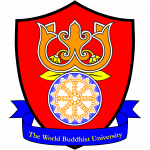About WBU
History
The world Buddhist University (WBU) was established in B.E. 2541 (1998) by a resolution of the World Fellowship of Buddhists General Conference held between October 29 and November 2, 1998, in New South Wales, Australia. This conference marked two auspicious occasions. The first occasion was the celebration of the 84th birthday anniversary of H.H., Somdej Phra Yanasangvara, the Supreme Patriarch of the Kingdom of Thailand, and the High Holy patron of the World Fellowship of Buddhist. This event occurred on October 3rd , B.E. 2540 (1997). The second occasion was the anniversary of the founding of the World Fellowship of Buddhist on December 6, B.E. 2543 (2000).
Status
The World Buddhist University has a similar role to that of the United Nations University. The WB University Centre serves as its headquarters, located in Thailand, is the main coordinating Centre. It has, in its organization and administrative structure, five Institutes consisting of,
- The Institute of Research and Development.
- The Institute of Training and Curriculum Development.
- The Institute of Spiritual Practice and.
- The Institute of Educational System Based on Buddhism.
OBJECTIVES
The main objective of the university is to conduct advanced Buddhist studies and to co-ordinate with the Buddhist Universities and other academic institutions which offer studies of Buddhism and related subjects all over the world in the fields of research, training, spiritual practice and education based on Buddhism.
PURPOSES
- To serve as a Coordinating Centre to exchange academic works, research and development and related information at local, regional and international levels.
- To develop and promote the science of Buddhist education to be more universally accessible.
- To offer alternatives for educational system aiming to perfect development of human being and society together with creation of a civilized world in accordance with law of nature.
- To involve Buddhism in solving regional and global ossues.
- To provide and facilitate Buddhist academic services to the World Fellowship of Buddhist, its members and organizations working for the same ends.
